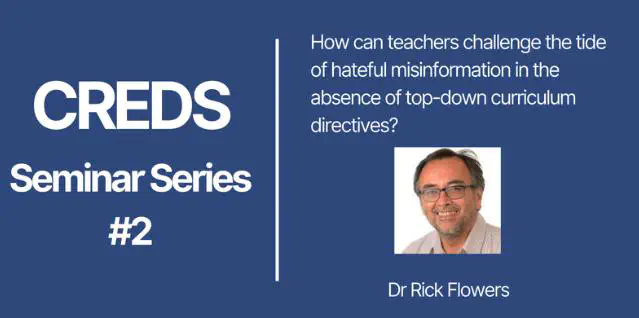Challenging Hateful Misinformation
A Researcher’s Perspective on Educational Strategies

In the latest CREDS seminar, Dr. Rick Flowers, a senior lecturer at the University of Technology Sydney, discussed his ongoing research into how teachers can tackle the rising tide of hateful misinformation in schools. He emphasized that while there is growing awareness of the importance of critical media literacy, there remains no top-down curriculum directive in Australia to address this issue. Instead, educators are often left to find their own strategies to embed critical thinking and media literacy into existing subjects.
Dr. Flowers began by defining two key concepts: misinformation, which is false information spread unintentionally, and disinformation, which is deliberately misleading or malicious. He highlighted that UNESCO has recognized the importance of addressing these issues, launching a global initiative to equip educators with tools to counter misinformation.
A key part of Dr. Flowers’ research involved following up with teachers who had participated in workshops designed by the NGO “Altogether Now,” which offers professional development for combating hateful misinformation. Surprisingly, many teachers reported that their students felt confident in their ability to navigate misinformation, suggesting they did not perceive it as a major threat. Some students believed they were media-savvy enough to recognize fake news and avoid spreading it. This raised an important research question: How do young people really perceive the problem of hateful misinformation?
Teachers’ views on the issue varied. Some felt that the threat of misinformation was not significantly different from past challenges to critical thinking, while others viewed it as part of the unique challenges of the post-truth era. The lack of structured curriculum support leaves teachers to embed media literacy where they can, such as in philosophy, economics, or social studies. However, the consensus among educators interviewed was clear—more needs to be done to prepare students to critically assess the vast amount of information they encounter online.
Dr. Flowers also discussed how structural approaches, including an understanding of the political economy of digital media, are needed to go beyond basic critical thinking and debunking strategies. He called for deeper analysis of how algorithms, echo chambers, and filter bubbles shape the media landscape and contribute to the spread of disinformation.
In his final reflections, Dr. Flowers touched on the need for what he termed “education for uncomfortable emotions.” He proposed that schools could create spaces for students to engage with opposing viewpoints, particularly in relation to figures like Andrew Tate, whose ideas have been linked to harmful ideologies. He acknowledged the potential challenges and risks but argued that creating these spaces is essential for helping students learn to coexist and negotiate diverse perspectives, which is a crucial aspect of democratic education.
As schools continue to grapple with misinformation, the insights from Dr. Flowers’ research underscore the need for broader systemic support, including curriculum reforms, to equip both teachers and students with the tools they need to navigate the complexities of the digital age.